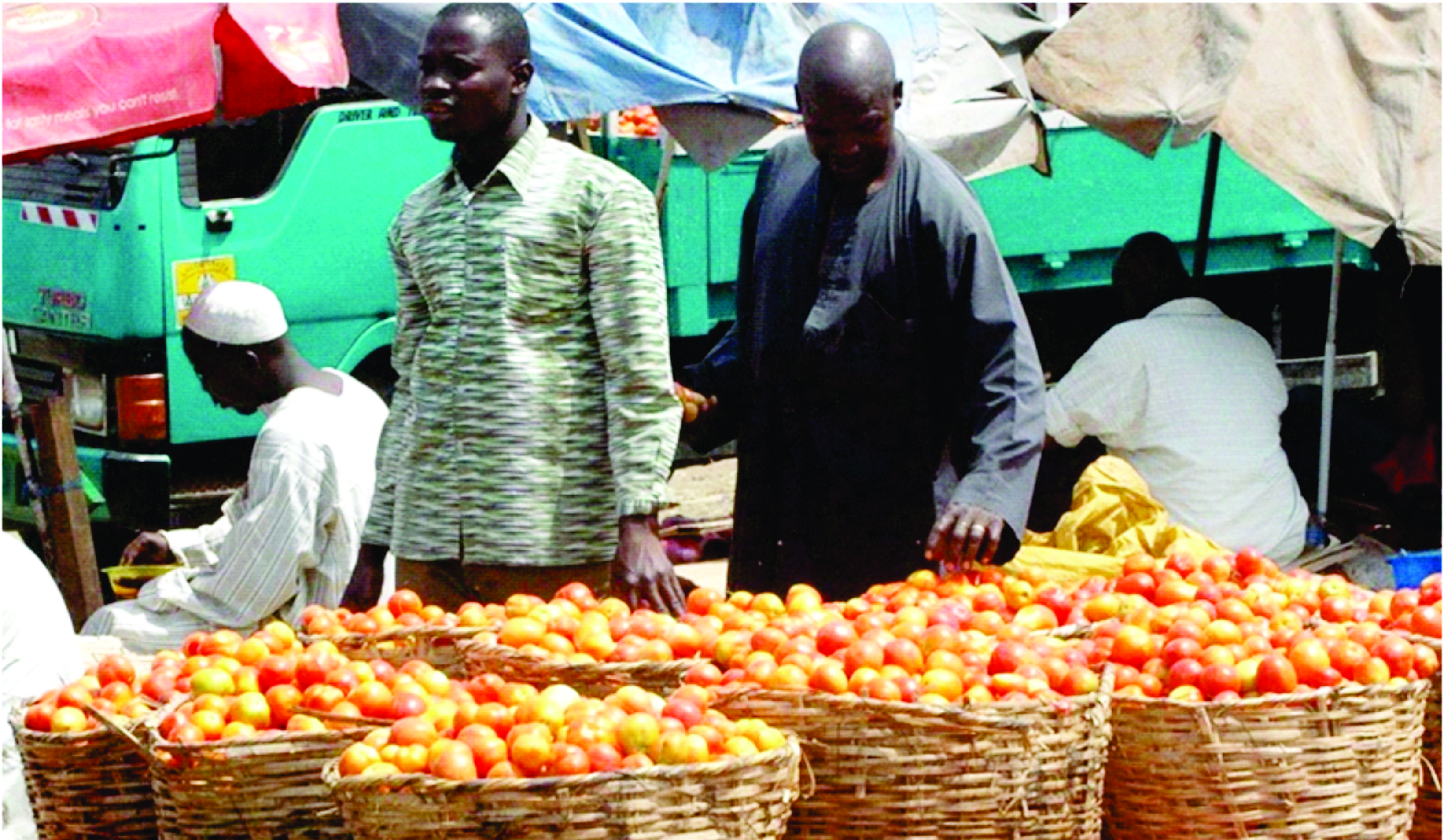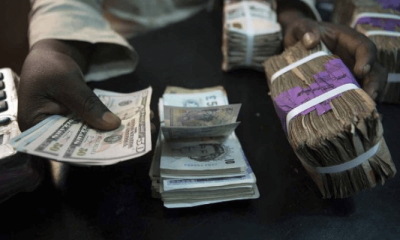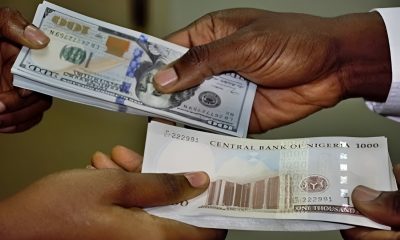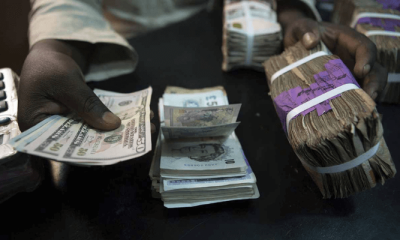Business
Endless agony as inflation set to hit double digit
Published
8 years agoon
By
Olu Emmanuel
• Price of foodstuff on the rise
By ODUNEWU SEGUN
THE prices of goods have continued to be on the rise as Nigeria grapples with currency controls. National Daily gathered from market survey that nearly every segment of household goods and consumables have their prices on the rise, indicating that the falling value of the naira against the dollar is starting to take effect.
This is not unconnected with the drop in the price of crude oil as well as forex policy by the Central Bank of Nigeria which is now having a ripple effect on the larger economy. Tomatoes, one of the most common perishable commodities in Nigeria, sold in Lagos, at an average price of N679.50 for a paint container (6 litres; 2 kilograms) over the past six months compared to N540 in H1 2015 and N500 in Q4 2014 representing an average increase of 26%.
Similarly, the price of pepper was also said to have gone up with a paint container of pepper selling for an average price of N700 over the second half of 2015 compared to the period in our previous report where it sold for an average price of N630. This represented an increment of 11%.
ALSO SEE: Nigerian naira hits record low of 345 per dollar
However, prices of Beans and Garri remained stable during the period.Household consumables and personal hygiene products such as detergent, toiletries, and vanity items saw an average price increase in most cities with Lagos recording the highest of about 27% Liquid detergent aggregated a price increase from an average N210 in the last quarter to N250 this quarter to continue a trend which saw an increase from N180 in the Q4 2014 to N210.
Household needs such as toilet wash, air fresheners, brooms, dustpans and mop sticks also increased by 20%, 15%, 15%, 10% and 25% respectively in the second half of 2015.Female use items which include beauty and personal care products, cosmetics all increased by at least 10%, and increase attributed by traders to the unstable exchange rate of the American dollar to the Naira.
It was also gathered that the reason for these increases point to four major factors which typically affect prices of goods and services in Nigeria. Transportation, Insurgency and Stability, Climate Change, Availability of Labour, Climate change and exchange rate fluctuations as the major reasons for the price increases recorded. The report also suggested that a further devaluation of the Naira could even make the situation worse.
The National Bureau of Statistics report also shows inflation rate has been rising and could hit double digits before the end of the second half of 2016 if things persist. The government budget debacle has rubbed more salt to the injury as the jolt required by an ailing economy to improve is now being further delayed for several weeks if nor months.
According to the Economist, government’s response to the crisis has been three-pronged. First, it is trying to stimulate the economy with a mildly expansionary budget. At the same time, it is trying to protect its dwindling hard-currency reserves by blocking imports. Third, it is trying to suppress inflation by keeping the currency, the naira, pegged at 197-199 to the dollar.
A Professor of Financial Economics at the University of Uyo, Akwa Ibom State, Leo Ukpong, who expressed surprised at the decision of the CBN, said, “The economy is extremely suffering now”
The Managing Director and Chief Executive Officer, Economic Associates, Dr. Ayo Teriba, said the foreign exchange supply issue is the problem. “I think the foremost challenge is the stability of the naira, and I don’t think it is the core of the MPC. The reason the naira is unstable is the decline in oil price that has led to a corresponding decline in foreign exchange available to Nigeria.
“The only way you can stabilise the exchange rate of the naira is to find alternative sources of forex to replace the income lost from the decline in oil price.”
The Head, Department of Banking and Finance, Nasarawa State University, Keffi, Uche Uwaleke, commended the CBN for not bowing to pressure to devalue the naira.
Uwaleke, an Associate Professor of Finance, told one of our correspondents that it would be wrong for the CBN to devalue the naira at a time when the country was not earning enough income from exports.
He noted that devaluing the currency would only provide a temporary solution to the nation’s economic problems, adding that it would be better for the CBN to continue to restrict foreign exchange for the importation of non-productive items.
Uwaleke, however, called on the CBN to revisit the ban on forex sale for the importation of 41 items to stimulate activities in the manufacturing sector.
The Managing Director/Chief Executive Officer, Cowry Asset Management Limited, Mr. Johnson Chukwu, said, “It was my wish that they would adjust the midpoint of the exchange rate to a more realistic and market-reflective rate, but I was not quite sure that they were going to do that given the clear position of the executive arm of government, which had objected to any devaluation of the naira.”
ALSO SEE: Sterling Bank sets to acquire Keystone bank, one other
In a report released by Economic Intelligence Group, the rise in the food index, according to the experts, is expected to be driven by increases in prices of agricultural items such as rice, groundnut, maize, and tomatoes as an aftermath of flooding witnessed in some parts of northern Nigeria.
“The core sub-index is expected to moderate downwards due to slower pace of advance in sub-divisions such as clothing, fuel, lubricants, housing and water. Prices of items on the core sub-index are rising at a slower pace due to weaker consumer demand following pass through effect of Naira depreciation to higher prices and shrank disposable income) at the bureau de change (BDC) and parallel markets.”
Going forward, the team said the persistent inflationary trend in the local economy may likely prompt investors to adjust their yields expectation higher especially now that yields are on a downward trajectory across tenors.
“Since our last inflation forecast report, yields on the 3 year bond have dropped by 4.7 percentage points, yield on the 5 year bond by 1.8 percentage points, 7 year bond by 1.4 percentage points; 10 year bond by 1.5 percentage points and 20 years bond by 2.4 percentage points”, the team said.
You may like


CBN denies instructing banks to restrict crypto accounts


CBN sells fresh dollars to BDCs at N1,021/$


Ban on foreign currency collateral for Naira loans will enhance FX liquidity—experts


Naira reverses gain against Dollar at parallel market


CBN unsettling the systems with mass retrenchment exercisie—expert


Nigeria’s inflation soars again in March
Trending

 Football6 days ago
Football6 days agoGuardiola advised to take further action against De Bruyne and Haaland after both players ‘abandoned’ crucial game

 Health & Fitness13 hours ago
Health & Fitness13 hours agoMalaria Vaccines in Africa: Pastor Chris Oyakhilome and the BBC Attack

 Aviation1 week ago
Aviation1 week agoDubai international airport cancels flights as flood ravages runway, UAE

 Featured4 days ago
Featured4 days agoPolice reportedly detain Yahaya Bello’s ADC, other security details

 Comments and Issues6 days ago
Comments and Issues6 days agoNigeria’s Dropping Oil Production and the Return of Subsidy

 Education5 days ago
Education5 days agoEducation Commissioner monitors ongoing 2024 JAMB UTME in Oyo

 Business5 days ago
Business5 days agoMaida, university dons hail Ibietan’s book on cyber politics

 Education1 week ago
Education1 week agoOsun NSCDC solicits cooperation towards national assets protection

